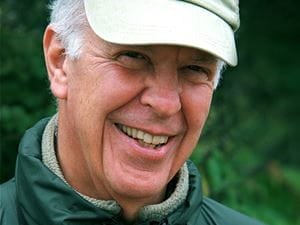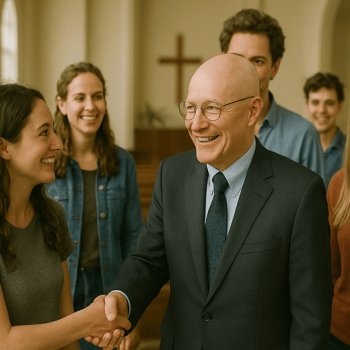
Over the course of his eight decades, Parker J. Palmer has become a beloved teacher, best-selling author, and renowned leader of people and organizations. In this personal essay, Palmer reflects on how his faith has changed over time. His life has been marked by times of crisis and depression, but also by love, grace, forgiveness, and the experience of resurrection. Palmer calls himself a “contemplative by catastrophe”: “I’m most likely to go deep only when I slam into a wall or fall off a cliff.”
Given the state of Christianity these days, writing about how my Christian faith has changed with age requires a bit of a baseline.
I’m a white, straight male, born in 1939, raised in a middle-of-the-road Methodist Church in suburban Chicago. I went to a college where intellect and values were given priority, but faith was not regarded as forever incompatible with reason. I spent a year at social justice-oriented Union Theological Seminary in New York City, did a Ph.D. in sociology at Berkeley where I spent half of the 1960s, then became a Quaker as I moved toward nonviolent and antiracist activism.
I self-identify as Christian, but was never introduced to the God some Christians talk about—the one who wants white men to flourish while they subjugate women, people of color, and nature itself, and work hard to turn our democracy into a theocracy. I’ve always believed that such a God is found only in certain types of authoritarian personalities and crypto-fascist politics. As Anne Lamott famously said, “You can safely assume you've created God in your own image when it turns out that God hates all the same people you do.”
I’ve needed to unlearn and learn a lot in my 81 years, but I’ve not had to learn the difference between Christian faith and a power play or a personality disorder. I speak strongly of these things because for years I’ve watched a faith tradition I value trashed by people like Jerry Falwell, Jr. and his political pals who profess the faith only to exploit it for power, fame, and fortune.
My personal crisis of faith began in my thirties when I realized that the faith I claimed did not reflect my experience. Instead, it was built of what I had picked up from my upbringing, book-learning, and reputable lecturers and preachers.
When my crisis hit, I was attending a Quaker meeting for worship, where there were neither readings nor preaching to prop up the faithful. In a Quaker (or Friends) meeting, the only teacher available is one’s inner teacher—but mine was not speaking loudly enough to be audible. Unpropped, my faith began to fall apart at a time when I needed help.
Making it through that crisis took time, patience, and understanding from older Friends who didn’t judge me or try to “fix” me, but gently invited me to explore my inner turmoil. At first, I blamed the silent meeting as a bogus and lazy form of “worship”—it’s always easier to blame your problems on sources other than yourself. Then I began to see that I was the lazy one—lazy for having embraced a flimsy prefab faith that was collapsing around my ears. Clearly, the task ahead was to forge a faith built on “what I knew experientially,” to use a classic bit of Quaker-speak.
It’s been forty years since that time, and today I’m grounded not in beliefs about but experiences of love, grace, forgiveness, and resurrection. Those concepts first came to me from the Christian tradition, and I’m grateful for the gifts. But that inheritance came to me by pure accident, the accident of birth, and there’s nothing superior about it. Parallel notions are found in other wisdom traditions, which I find no better or worse than what I’ve embraced as my own. Each of them is a facet of a prism that refracts the universal Light in its own way.
To answer a question I can hear readers asking, what does it mean to have had an experience of resurrection before one dies? As of this writing, I’m not dead-dead, and I’m not privy to reports from “the other side.” But people suffer from many forms of death-in-life. Mine came in the form of three deep dives into clinical depression, two in my forties, one in my sixties. People who’ve been there know that “death-in-life” is not an exaggeration; consider the number of sufferers who sadly but understandably (at least, to me) decide that suicide is preferable to depression.
In depression, God is dead, or so it was for me. As a result, I can’t write warmly about how “God was with me every step of the way,” helping me survive depression and thrive on the other side. But the fact that I have personal knowledge of resurrection, in the form of surviving and thriving, has given me a chance to learn something worth knowing: the counsel in the Hebrew Bible to “choose life, not death” is not the no-brainer I once thought it was. There are times in life when death seems the better choice, when we are—to quote Guatemalan poet Julia Esquivel—“threatened with resurrection.”
In search of a perverse form of ”safety” or “comfort,” we sometimes settle for death-in-life. When I was depressed, no one expected anything of me. If I were “resurrected,” what might I be called on to do next? If I leave a job that’s killing my spirit, how would I make a living? If I free myself from a dysfunctional relationship, how could I ever find another?
My received theology would have left me clueless about the threat of resurrection. In that view of the human experience, death is always the threat and resurrection always the hope. But a theology that includes my experience of death-in-life has helped me see the many ways in which I’m tempted to “choose death” in order to “stay safe,” as in the way we sometimes cling to simplistic, formulaic, and life-denying “answers” to vexing questions.
My longtime spiritual quest has not been religious in the creedal or institutional sense, but spiritual in the generic sense. By “spirituality,” I don’t mean some sort of connection with that which the established wisdom traditions name as the transcendent. I mean any way a person has of responding to the eternal human yearning to be connected with something larger than one’s own ego.
I like that definition because it’s open to the wide range of “spiritualities” that have emerged on the human journey, from the highest forms of nobility to the basest forms of evil. On the noble end of that continuum, you can find examples from all of the world’s major wisdom traditions, including secular humanism. On the evil end, what is fascism except a misguided response to times of loss and despair by people desperate to reclaim fictional eras of national and personal “greatness”?
Hitler may be dead, but fascism never dies. Why? Because it’s a “spirituality” in which individuals and nations find identities by getting “connected with something larger” than themselves—such as Aryan or White supremacy, or American exceptionalism—toxic belief systems built on maligning, marginalizing, and endangering the lives of any and all who are “other.” Show me a nation where the once-dominant class and race will become a minority within forty years, and I’ll show you a nation ripe for a fascist takeover.
History makes it clear that a wide range of spiritualities have been powerful drivers of human history, for good and ill. So it baffles me that many secularists (who have their own spirituality) want to exclude academic studies of the subject from our educational system. Students need to understand what’s at stake when they seek an answer to that “eternal human yearning,” and they need tools of discernment to choose answers that are life-giving, not death-dealing. That should be one of the aims of education at every level.
My spiritual journey has been helped along by redefining or reframing key concepts whose content has meaning for me but whose “packaging” no longer works for me—as witness my reframing of “spirituality” itself. I’ve also had to reframe the ancient practice of contemplation.
In recent decades, contemplation has been presented as one form or another of silent receptivity, sometimes sitting, sometimes walking, but always disengaged from the world of action. I admire people who seem to be “contemplatives by intention,” people who rely on stillness and silence alone to take them to deeper truths. But I’m a “contemplative by catastrophe.” I’m most likely to go deep only when I slam into a wall or fall off a cliff, and I need an understanding of contemplation that honors that fact.
So I reframed contemplation as “any way a person has of penetrating illusion and touching reality,” whether it’s about self, or world, or the relation between the two. That’s a functional definition of what traditional forms of contemplation do for their devotees, one that works for non-traditional “practitioners” like me.
For example, when I succeed at something, especially something big, it does not drive me into deep reflection. Instead, it propels me toward ego-inflation, one of the biggest illusions of all. But when I fail, especially publicly, I go into deep contemplation around 3:00 AM, trying to understand what illusions about myself, my world, and the way we dance took me into this slough of despond.
If I keep at it, I eventually find a deeper layer of truth. It’s often a hard truth. But motivated by a deep desire to stay out of the swamp, I do my best to live into it. Then I get lost again. For all I know, this essay will fall short of what I intended with it; if so, it’s back to the swamp for me. That’s where, for sixty years, I’ve learned important lessons about becoming a better writer and teacher, maybe even a better person.
Some readers may have noticed that I did not use the word “God” in this essay, except when describing the “God” I don’t believe in. My reason is simple: no one knows “God’s” true name, and anyone who claims to know it is blowing smoke. When I can avoid it, I prefer not to use a word that obscures more than it reveals, a word that tends to build walls rather than bridges. If you can you lose your own tradition’s shop-talk when trying to communicate with folks outside your circle, it’s an effective deterrent to spiritual arrogance and idolatry.
On my branch of the Christian family tree, this practice has Biblical warrant, for those who worry about such things. When I was young, I heard a well-known passage from Second Corinthians: “But we have this treasure in earthen vessels, to show that the transcendent power belongs to God and not to us.” (RSV) Even back then, it occurred to me that the “earthen vessels” in question included the creed we recited at church and the theology behind it, as well as the words of the texts quoted by my preacher, and the words he spoke as he interpreted those texts.
That’s when it came to me that when we get a more direct sense of “the transcendent power” itself, we may need to shatter the vessels that limit our understanding of it, and our ability to connect with others about it. Later, I learned that this practice is called “iconoclasm,” a hedge against idolatry. So count me as an iconoclast who uses the word “God” only as a last resort.
That does not mean that I deny or am skeptical about a “transcendent power.” Years ago, I was hiking in the high desert outside of Taos, New Mexico, at the foot of the Sangre de Cristo Mountains. I found myself in a place with no humans or human creations in sight, when I was stopped in my tracks by a bone-deep sense of a cosmic truth: I am a mere speck of being in a cosmos that is utterly indifferent to me and utterly accepting of me, even forgiving.
I stood still for a long time, trying to hold on to that precious insight in its raw immediacy. Then it passed and I slowly walked on, still in a daze, reflecting on what felt like a direct experience of transcendence.
When people ask, “Did you experience God?,” all I can say is, “Who knows? I experienced what I experienced, that’s all I can say.” When people say, “I bet a neuroscientist could explain that one,” all I can say is, “Who cares? I experienced what I experienced, that’s all I can say.”
So file that one as mystery, the kind that’s worth walking around and pondering for a lifetime, the kind that’s killed off when people try to dissect it theologically or scientifically.
I’ll give the final word to Robert Frost, who wrote a simple couplet that speaks of mystery better than I can:
We dance round in a ring and suppose,
But the Secret sits in the middle and knows.
The way forward seems clear to me. Let’s gather with folks who understand mystery differently than we do—and recognize that we all suppose and none of us knows—and find out what we can suppose together.
8/16/2021 6:21:42 PM




